
HOW TO REMOVE BLOOD STAINS FROM SHEETS
It is never pleasant to find a blood stain on your sheets, bedding, comforter or pillow, but there’s a good chance that you can remove it. The quicker you get to the stain, the easier it may be to treat. But don’t fret, even dried blood can potentially be cleaned off bed sheets.
Keep in mind that you need to use cold water when treating a blood stain. Follow the guide below to help you remove a blood stain from sheets in three easy steps.

WHAT YOU MAY NEED TO REMOVE BLOOD FROM SHEETS
You can typically use common household staples to spot-treat a blood stain. Always try the treatment on a small, inconspicuous spot first and refer to the care tag and washer owner’s manual before you treat a stain with non-detergent substances. Delicate fabrics may not tolerate household remedies and some shouldn’t go in your washer, so always rinse thoroughly before putting a pre-treated item in the wash.
If you get blood on your sheets, you’ll want to act fast, so rinse it with cold water and try one of the following:
- Laundry detergent
- Oxygen bleach
- Vinegar
- Hydrogen peroxide
- Bar soap
- Baking soda
- Lemon juice
Learn more tips to help you streamline laundry day.
HOW TO REMOVE FRESH BLOOD FROM SHEETS
Treating a fresh blood stain quickly can make cleaning it easier. Simply flush the stain with cold water, soak it in cold water and laundry detergent, then wash your sheets in a cold water wash cycle. Always check the care label before you begin. Read on to learn how to get blood out of sheets.

1. RINSE UNDER COLD WATER
Rinse the blood stain under cold water. Only use cold water to remove blood because heat can cause proteins to bind to fibers, which can set the stain into the fabric.

2. SOAK AND TREAT THE STAIN
Run cold water into a sink or large bowl and add enzyme laundry detergent or a mild detergent for delicate fabrics like linen sheets. Soak your sheets for at least 30 minutes. If the stain remains, apply the detergent directly to the spot and gently work it in.

3. WASH USING A COLD WATER CYCLE
Set your washing machine on a cold water wash cycle and wash your sheets with oxygen bleach. Repeat the cycle if the stain persists. Avoid putting your sheets in the dryer until the stain has been removed.

Need help finding your next washer?

Will your washer fit your space?

HOW TO GET DRIED BLOOD OUT OF SHEETS
Even though a blood stain tends to be easier to remove when it’s fresh, you may still be able to remove it if it’s dried. You’ll want to scrape the dried blood, soak the stain in cold water with detergent and then wash your sheets in cold water in your washer. Always check the care label for specific instructions.
Follow the steps below to spot-clean a dried blood stain from your sheets.

1. SCRAPE BLOOD OFF THE FABRIC
Use a blunt knife or spoon to scrape any dried blood off the stain on your sheets.

2. COLD WATER SOAK
Pretreat the blood stain by putting your sheets into a sink or bowl of cold water along with enzyme laundry detergent or a detergent for delicate fabrics. Use cold water as heat may set the stain into the fabric. Allow your sheets to soak for a few hours, checking on them occasionally and gently scrubbing the stain until it has been removed.

3. WASH USING A COLD WATER CYCLE
Put the sheets into your washing machine and add oxygen bleach. Be sure to use a cold water wash cycle. If the stain remains, run the cold water wash cycle again. Don’t dry your sheets in the dryer until the stain has been removed.
Learn more about different washing machine settings and temperatures and get specific steps on how to properly wash laundry.
HOW TO GET BLOOD OUT OF DIFFERENT TYPES OF SHEETS
If you’re wondering how to get blood out of white sheets, the steps are usually similar to colored sheets, although it may vary depending on the fabric type. Removing stains from white clothing can be different as it depends on the type of stain.
Don’t use chlorine bleach as it may deepen blood stains. Avoid putting your sheets in the dryer until the stain has been removed. The following includes common fabric types for sheets and how to treat the blood stain.
COTTON SHEETS
For cotton sheets, rinse the blood stain under cold water. Soak in cold water with an enzyme laundry detergent. Apply detergent to the spot if the stain persists and gently work it into the fabric. Run a cold water wash cycle with oxygen bleach.
LINEN SHEETS
Linen is a delicate fabric. After you rinse the blood stain under cold water, soak it in cold water with a mild detergent. Instead of rubbing the fabric, gently squeeze soapy water through your sheets to help lift the stain. Set your water on a cold water wash cycle and add oxygen bleach.
BAMBOO SHEETS
To treat a blood stain on bamboo sheets, flush the stain with cold water. Fill your sink or large bowl with cold water and soak with an enzyme laundry detergent. For a stubborn stain, gently scrub with detergent. Add your sheets to a cold water wash cycle with oxygen bleach. Avoid using chlorine bleach.
MICROFIBER SHEETS
Microfiber fabric is a synthetic material that consists of nylon, polyester or wood pulp. To treat a blood stain, rinse it under cold water, then soak it in cold water and enzyme laundry detergent. If the stain persists, gently scrub the spot with detergent. Wash in a cold water wash cycle with oxygen bleach.

7 BLOOD STAIN REMOVERS
The following are common household staples you can use to treat a blood stain. Make sure to check the care tag instructions before pretreating, as some fabrics can be more delicate than others.
You’ll also want to consult your washing machine manual before adding anything other than recommended products to a wash cycle. For other stains and spills on clothing, check out this guide on how to remove common stains.
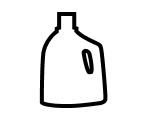
LAUNDRY DETERGENT
You can usually use an enzyme laundry detergent, such as Swash® Laundry Detergent1, to help remove blood stains on sheets. But make sure to use a mild detergent on delicate fabrics such as linen. Check the label on your detergent before using it to treat a stain.
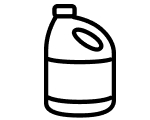
OXYGEN BLEACH
Using oxygen bleach in a cold water wash cycle can help with stain removal. Look for products labeled “Oxy” and “stain remover.” Oxygen bleach is typically safer on colors than chlorine bleach. Avoid using chlorine bleach on blood stains, as it may cause a chemical reaction that can deepen the stain.
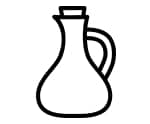
VINEGAR
Distilled white vinegar can generally be used to treat a blood stain, although avoid putting it on delicate fabrics like linen. Prepare a mixture of one part vinegar to two parts cold water and apply it to the stain.
Thoroughly rinse the vinegar from the treated area with cold water. Don’t add vinegar to your washing machine. The acidity in vinegar can erode certain parts in your washer, like rubber seals and hoses.

HYDROGEN PEROXIDE
To spot-treat a blood stain, dab the stain with hydrogen peroxide or create a paste of baking soda, salt and hydrogen peroxide. You can also use hydrogen peroxide instead of chlorine bleach to bleach laundry items. Always rinse the item thoroughly before putting it in the washing machine.

BAR SOAP
In a pinch, reach for a bar of soap to try and help remove blood stains from sheets. Gently dab the area with bar soap and soak in cold water.
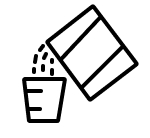
BAKING SODA
Baking soda can be used in your laundry routine to brighten and neutralize odors and to help treat blood stains. Make a paste using equal parts of baking soda and cold water. Gently blot the stain with the mixture and soak in cold water.

LEMON JUICE
You can spot-treat a blood stain with lemon juice on certain fabrics. Saturate the stain with lemon juice and allow it to sit for five minutes, then rinse thoroughly. Lemon juice may fade colored sheets, so only use it on white sheets. Don’t use lemon juice on delicate sheets like linen as it may damage the fabric. Always check your care tag first.
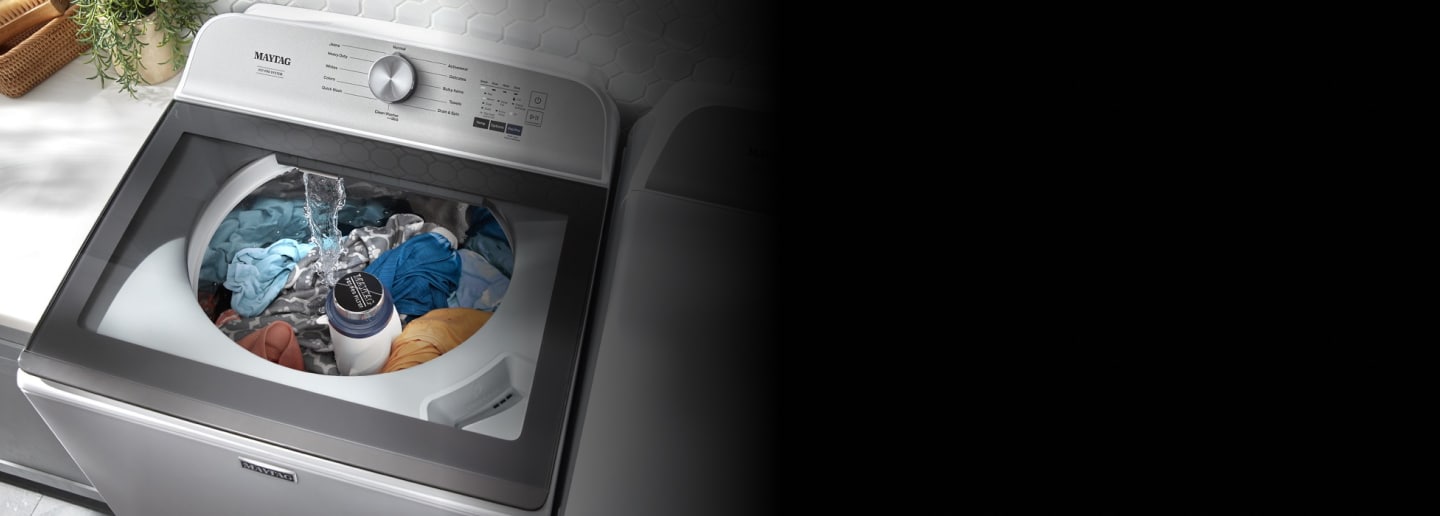
Maytag® washing machines
Designed for performance, control and convenience
Maytag® washing machines take stain fighting seriously with cycles built to push the limits of power
EXPLORE MAYTAG® WASHERS
Maytag® washers are designed with performance and durability in mind to help keep laundry day running smoothly. Select models have convenient features such as Extra Power to boost stain fighting on any wash cycle or the Built-In Water Faucet to rinse, spot treat or soak your sheets right in the washer. Explore washing machines by Maytag brand to find the one that’s right for your home.
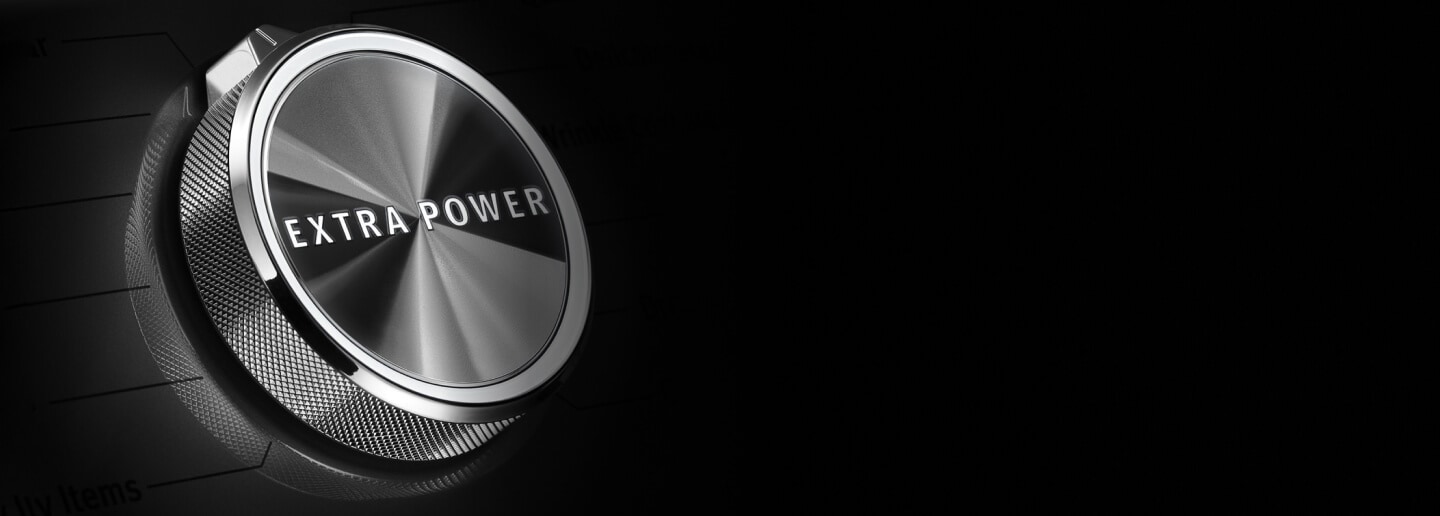
Extra Power
BOOST STAIN FIGHTING ON ANY WASH CYCLE
Maytag® washers with Extra Power give clothes an intense pre-wash and extra agitation to help wash stains away
Was this article helpful? Pass it on
DISCOVER MORE FROM MAYTAG BRAND
1. Swash and the recommending brands are owned and distributed by Whirlpool Corporation.


